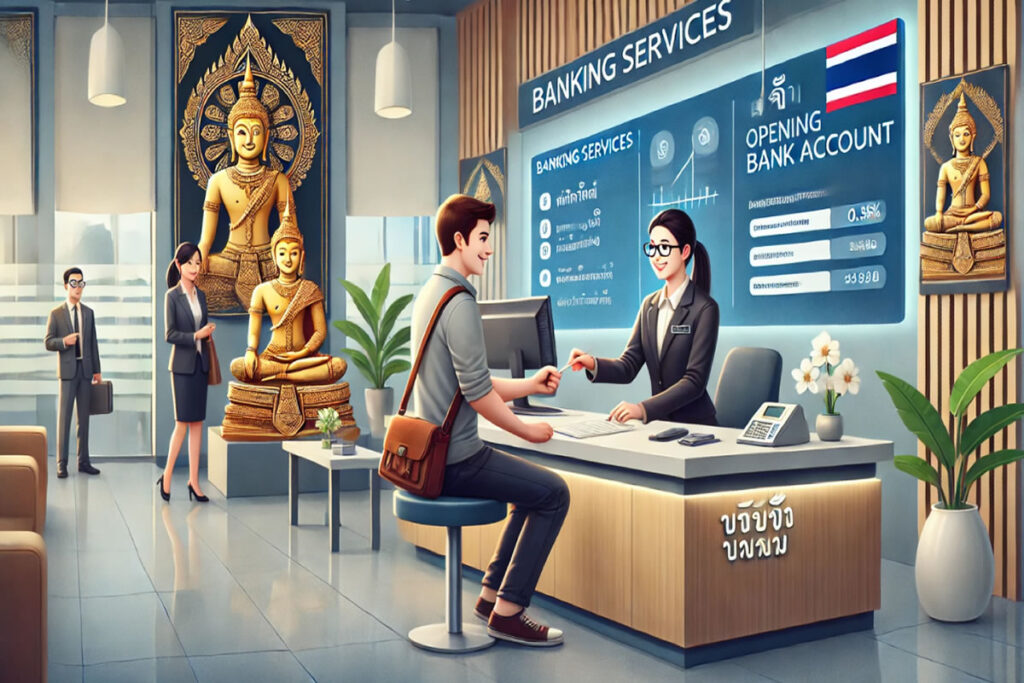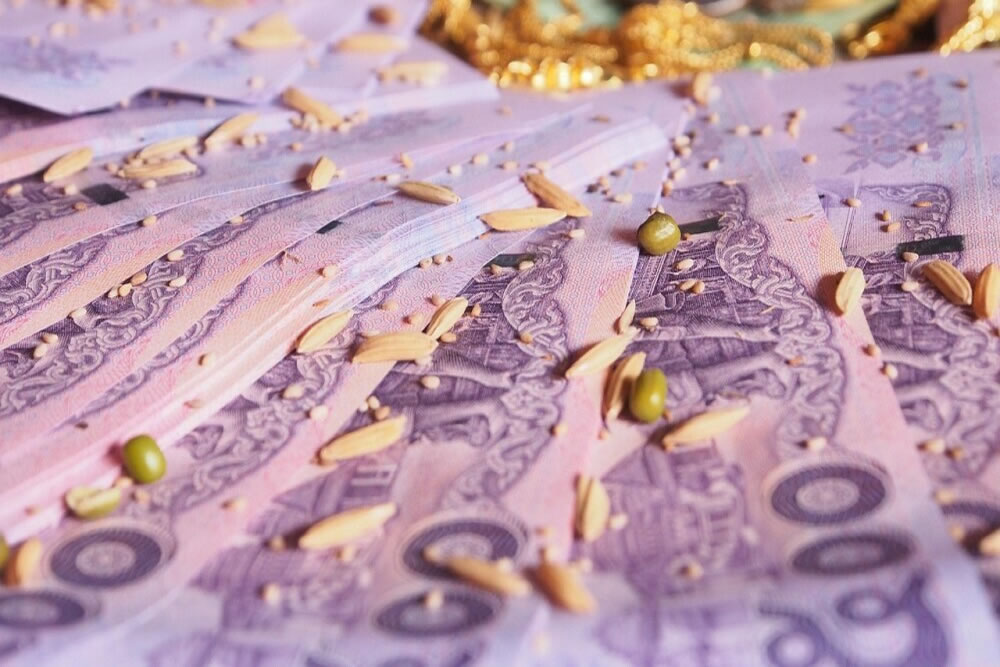
Opening a bank account in Thailand as a foreigner can be a convenient way to manage your finances, whether you’re living, working, or traveling in the country.
However, the process varies depending on your visa type, the bank you choose, and even the specific branch. Here’s everything you need to know.
Visa Requirements Vary
Opening a Thai bank account as a foreigner can vary widely based on one main factor: your visa status. Some banks are more accommodating than others, allowing tourists to open accounts with just a passport, while others demand more substantial proof, like a long-term visa, such as a Non-Immigrant Visa, Work Permit, Retirement Visa, or Education Visa.
Bangkok Bank is often the most accommodating for short-term visitors, while others may require more documentation. Whatever your situation, be prepared to meet different requirements.
Required Documents
Before heading to the bank, gather all necessary documents, starting with a valid passport. A proof of address in Thailand is typically required too, like a lease agreement or a utility bill.
Prepare any additional paperwork that might boost your chances, if you’re working, a work permit might be needed, or if you’re studying, a letter from your university. It’s always smart to carry a document proving your reason for being in Thailand.
To open an account, you’ll typically need:
- A passport with a valid visa stamp
- Proof of address in Thailand (lease agreement, utility bill, or a letter from your embassy or employer)
- A work permit (if applicable) or an official letter from a Thai university (for students)
- A Thai phone number, which some banks may require for mobile banking access
Bank Branch Policies Differ
Branch shopping might sound unusual, but it’s often needed due to the different interpretations of rules between branches. If the first branch doesn’t work out, another one might be more accommodating. It’s beneficial to talk to locals or expats who have opened accounts recently to get tips on which branches have friendly policies.
Even within the same bank, different branches may enforce different rules. If you’re rejected at one branch, try another – especially in expat-friendly areas.
Making an Informed Choice: Which Thai Bank is Best for Foreigners?
If you’re searching for the most foreigner-friendly bank, Bangkok Bank often comes up as the go-to choice. Many foreigners report being able to open accounts with minimal fuss there, provided the branch allows it. However, don’t just bank on luck; prepare your documents thoroughly, as requirements can shift from one moment to the next.
The process isn’t just about paperwork. It’s also about understanding the experiences of others who’ve gone through it. Connecting with a community of fellow expats can provide real-time insights into current banking practices, success stories, and even recommend particular branch managers known for being flexible with foreign clients. Picking the right bank involves comparing what each one brings to the table.
Here’s a quick comparison of major banks and their foreigner-friendly policies:
- Bangkok Bank is a well-known favorite for foreigners, particularly because some branches have more lenient requirements. They often cater to those just arriving with minimal paperwork, but keep an eye on individual branch policies.
- Kasikorn Bank is another viable option, known for its friendliness towards expats. They generally require a long-term visa, but their customer service and online banking capabilities make them worth considering if you fit their criteria.
- SCB and Krungsri might pose slightly more hurdles, often needing a work permit for account creation. However, once you’ve cleared the entry requirements, they provide solid banking options and a range of services that can be beneficial if you plan to stay long-term.
- Government banks, such as Krungthai and GSB, commonly stick to stricter visa requirements. However, they might offer other advantages, like favorable terms for government-related transactions, which could be an edge for some expats working with state entities.
📌 Thinking about borrowing from a Thai bank once your account is set up? Learn what to expect in our guide to bank loans for foreigners in Thailand.
Types of Accounts Available
Savings Account – Best for Daily Transactions
- A savings account is the most accessible option for foreigners and is ideal for daily banking activities such as deposits, withdrawals, and bill payments. Comes with an ATM/Debit Card for local and international use. Access to Online & Mobile Banking. Very low Interest Rates (typically 0.25%–0.50% per year)
Fixed Deposit Account – Best for Higher Interest
- A fixed deposit account offers higher interest rates but requires you to lock in your money for a specific period. Some foreigners use this as an alternative if they lack a work permit or long-term visa, as some banks are more lenient with these accounts. Funds are locked in, reducing liquidity.
Multi-Currency Account – Best for International Transfers
- A multi-currency account allows you to hold, deposit, and withdraw foreign currencies such as USD, EUR, GBP, AUD, and JPY. This is particularly useful for frequent international transfers or if you receive foreign income. Limited availability (not all banks offer this to foreigners).

ATM & Debit Cards
Understanding the costs is vital as well. Account opening fees can range, and annual charges are typically around 200-500 THB for ATM or debit card services. It’s wise to inquire about these ahead of time so there are no surprises down the line.
- Most banks issue ATM/debit cards immediately.
- Annual fees range from 200-500 THB.
- Request international withdrawal access if needed.
Internet Banking & Mobile Apps
Setting up internet banking or mobile apps is a critical step once your account is opened. While it might require a little time and perhaps a Thai SIM card, it grants convenient access to your finances. Make sure you leave the bank with all necessary login details and understand the process.
- Ensure you receive your online banking login details before leaving the bank.
- Some apps require a Thai SIM card to function.
- Internet banking may need additional verification for international transactions.
Initial Deposit Requirements
Banks often ask for an initial deposit; it varies from 500 to 2,000 THB depending on the bank. Walking in with more than the minimum can sometimes ease the process, showing you’re serious about opening and maintaining an account.
- Can range from 500 THB to 2,000 THB, depending on the bank and account type.
- Some banks require a higher deposit for foreign applicants.
Foreign Currency Transfers & Exchange Rates
Thai bank accounts support international transfers, but fees and exchange rates can vary. Bangkok Bank, for example, has partnerships with certain U.S. banks that may lower incoming transfer costs.
However, services like Wise (formerly TransferWise) or Revolut often offer lower fees and much better exchange rates.
📌 Before choosing any specific service, it’s worth understanding how different transfer methods compare in practice. I break this down in detail in my guide to the cheapest way to send money to Thailand, including where hidden fees usually appear and how exchange rates really affect the final amount received.
If you’re regularly sending money to Thailand or receiving income from abroad, check out my full reviews for both options:
📌 Transferring foreign currency into Thailand? Depending on your residency status and the timing, it could make your income taxable. Learn more in our guide to Taxes in Thailand for Foreigners.
Alternatives If You Struggle to Open an Account
Don’t overlook the role of alternative services like Wise or Revolut. While they aren’t traditional banks, they offer seamless currency exchanges and are especially useful for those needing international transfers without hefty fees. They can often complement a local account or sometimes serve as a stand-alone option if account opening turns out challenging.
- Use fintech services like Wise or Revolut instead of a local bank account.
- Open a bank account in a neighboring country (e.g., Singapore) and use it for transactions in Thailand.
- Some branches in tourist areas are more flexible, so shop around.
Conclusion
Opening a Thai bank account as a foreigner can be a hassle, but with the right approach and documents, it’s possible. If you’re initially rejected, reviewing what went wrong and trying a different branch or even a different bank can yield success.
With a Thai bank account, you’ll enjoy easier financial transactions, better exchange rates, and reduced fees for payments and withdrawals. Being well-prepared, patient, and flexible with your approach makes a significant difference.
Would you like to share your personal experiences or from other expats? Let me know in the comments!

Bangkok bank are, according to me and many others on forums, are the worst at the moment. Difficulties opening accounts, and active accounts being closed or frozen with or Eason given until you turn up for a face to face discussion
No appointments….. sit and wait.
Thanks for sharing your experience! Some expats have reported increasing difficulties not only with Bangkok Bank but also with other major banks—everything from stricter requirements when opening accounts to active accounts being frozen without much explanation. While Bangkok Bank used to be a go-to option, policies and customer service seem to vary a lot from branch to branch, so experiences can be very inconsistent.